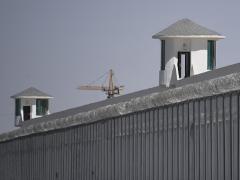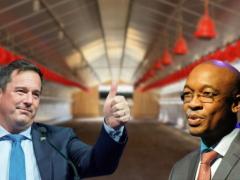A grouping of clearing and forwarding management is being assembled in Durban with the intention of giving voice to those involved in the vehicle forwarding sector, according to Chris Moodley of KZN Clearing and Forwarding. They also intend to air their discontent at Transnet’s increasing tariff rates despite a severe business slowdown at this time of economic crisis. The grouping – mostly involved in the vehicle supply chain – will not be any sort of registered or licensed body, with no constitution, he told FTW, but will be a meeting of like minds. But he felt that it would be a replacement for the nowdisbanded Cars Forum. “We wish to take over the reins and further our course of action to the credit of the clearing and forwarding industry,” he said, “and have called for a meeting between the clearing and forwarding agents and the relevant port authority departments at their office.” Moodley suggested to FTW that an article should be written, highlighting, as he said “the reasons for the about-turn in the shipping industry sector”. He added that the negative publicity going out to shippers and suppliers was because of the excessive tariffs the port was charging. It was causing shippers to divert their cargoes to other ports in Southern Africa, with Moodley citing Walvis Bay in Namibia as one of the more noticeable switches his company has seen, and Maputo in Mozambique as another – although a lesser competitor for SA ports, with its current rather limited number of scheduled vessel calls, and a very restricted list of sea trades served. “I will gladly pull out a whole file with these issues,” Moodley said, “and get my shipping comrades to voice their concerns/opinions as well.” The idea of creating his “likeminded” body, he told FTW, was because current channels of dialogue between industry and port were not highlighting the tariff concerns of the vehicle forwarders and transporters. A meeting planned with Transnet officials for the week after he talked to FTW, for example, “will not cover any relevant topics on the port tariffs, or any specific complaints we need to address – and I will have to seek alternative methods for our voices to be heard,” said Moodley. He has already expressed these feelings to the port authorities, but Transnet Port Terminals (TPT) has expressed discontent at the way he has approached and addressed them, and questioned the status of “the group”. Said Beverley Masson, TPT’s automotive channel manager and business unit executive at the Durban car terminal, in an e-mail released to FTW by Moodley: “I wish to caution at the tone and content of the various correspondence, which is personal, not within the business ethics practised by TPT – and is becoming more threatening and personal. “Should you have a query that can be discussed in a professional manner, I am willing to meet with you to discuss same. However, I will not respond to threats and abusive correspondence which I cannot understand.” Masson also rejected Moodley’s proposed group approach. “In terms of legislation,” she added, “I will not discuss tariffs in open communiqués or forums and this is done on a one-toone basis with the relevant stakeholder. “Should you have specific concerns regarding vehicles that you wish to discuss in a meeting where respect and dignity, in line with sound business ethics, are practised, the relevant business unit executive and customer services manager will meet with you to further discuss your concerns.” According to Moodley, a meeting with Transnet was scheduled, at which he intended to lay down the group’s concerns at what it described as “uncompetitive” port tariffs, and express an individual KZN Clearing gripe. In this, Moodley suggested that TPT was ignoring sections of its “rule book” which treat free storage for motor vehicles more liberally than those for general breakbulk cargo – and he was being charged incorrect storage time fees. “TPT,” he said, “has adopted a streamlined tariff for all cargo irrespective of whether the cargo is motor vehicles or breakbulk cargo.” But he quoted sections of TPT’s tariff guidelines which, he reckoned, invalidated TPT’s charges. TPT did not agree. According to Johan van der Walt, financial administrator of MPT Finance within TPT, “all clients were advised, with effect from April 1, 2009, that all vehicles are subject to the same principles as breakbulk cargo.” In effect, he added, this meant that the three free days for cleared storage would be calculated from the date the vessel completed discharge, and for any vehicles that were uncleared the rent due date would apply. “In the circumstances,” Van der Walt told Moodley, “the uncleared storage charge is considered to be correct and no refund can be granted.” Moodley, however, was adamant that his case was sound, and TPT would have to change its tune once his evidence was studied. He also told FTW that his group’s voice would be heard.












